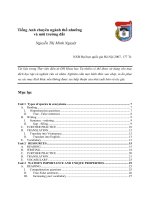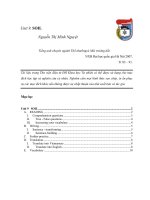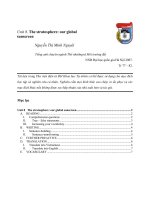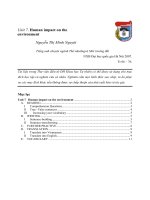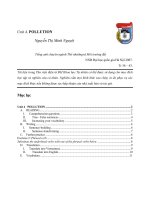Tiếng anh chuyên ngành TC NH
Bạn đang xem bản rút gọn của tài liệu. Xem và tải ngay bản đầy đủ của tài liệu tại đây (523.77 KB, 15 trang )
Nguyễn Minh Quân - TCDN54F
Tiếng Anh chuyên ngành TC-NH
I. Terminologies
Abenomics: Abenomics refers to the economic policies advocated
by Shinzō Abe, is based upon "three arrows" of fiscal stimulus, monetary
easingand structural reforms.
Bank account (Tài khoản ngân hàng):an arrangement that you have with
a bank that allows you to keep your money there, to pay in or take out
money, etc.A bank account can be a deposit account, a credit card, or any
other type of account offered by a financial institution.
Base-rate tracker mortgage (Khoản vay thế chấp theo lãi suất cơ bản):
The mortgage interest rate is linked to the interest rate announced by the
Central Bank.
Biometrics (Sinh trắc học):Biometrics refers to metrics related to human
characteristics and traits. It is also used to identify individuals in groups
that are under surveillance.
Breach of contract (Vi phạm/Phá vỡ hợp đồng): A legal cause of action
in which a binding agreement or bargained-for exchange is not honored by
one or more of the parties to the contract by non-performance or
interference with the other party’s performance. In the context, breach of
contract means the borrower is in default of loan.
Brokerage firm (Công ty môi giới):is a financial institution that facilitates
the buying and selling of financial securities between a buyer and a seller.
Brokerage firms serve a clientele of investors who trade public stocks and
other securities, usually through the firm's agent stockbrokers.
Building society:A building society is a financial institution owned by its
members as a mutual organisation. Building societies offer banking and
related financial services, especiallymortgage lending.
Capped mortgage (Khoản vay thế chấp theo lãi suất giới hạn):The
mortgage interest rate can only rise as far as a certain level.
Cash dispenser (máy rút tiền):a machine in or outside a bank, etc, from
which you can get money from your bank account using a special plastic
card.
1
Nguyễn Minh Quân - TCDN54F
Cash management account (Tài khoản quản lý tiền mặt)
Central bank (ngân hàng trung ương):A central bank, reserve bank,
or monetary
authority is
an
institution
that
manages
a state's currency, money supply, andinterest rates. Central banks also
usually oversee the commercial banking system of their respective
countries.
CHAPS (Clearing House Automated Payment System - Hệ thống
thanh toán bù trừ tự động): A CHAPS transfer is initiated by the sender
to move money to the recipient's account (at another banking institution)
where the funds need to be available (cleared) the same working day. No
pre-printed slip specifying the recipient's details is required. The funds
transfer is performed in real-time removing the issue of float or the
potential for payments to be purposely stopped by the sender, or returned
due to insufficient funds, even after they appear to have arrived in the
destination account.
Checks(Cheques - Séc):a printed form that you can write on and sign as a
way of paying for something instead of using money.
Collateral (Tài sản đảm bảo):property or something valuable that you
promise to give to somebody if you cannot pay back money that you
borrow.
Common stock (Cổ phiếu thường): Common stock is a form of
corporate equity ownership, a type of security.Common stock usually
carries with it the right to vote on certain matters, such as electing the
board of directors.
Congress (Quốc hội): the name of the group of people who are elected to
make laws.
Credit bureau (Văn phòng tín dụng): is a company that collects
information
from
various
sources
and
provides
consumer credit information on individual consumers for a variety of uses.
It is an organization providing information on individuals' borrowing and
bill-paying habits. Credit information such as a person’s previous loan
performance is a powerful tool to predict his future behaviour. Such credit
information
institutions
reduce
the
effect
of asymmetric
2
Nguyễn Minh Quân - TCDN54F
information between borrowers and lenders, and alleviate problems of
adverse selection and moral hazard.
Credit report (Báo cáo tín dụng): A report contains information about
your credit – and some bill repayment history – and the status of your
credit accounts. How often you make your payments on time. How much
credit you have. How much credit you have available. How much credit
you are using. Whether a debt or a bill collector is collecting on money you
owe.
Credit score (Điểm tín dụng): A credit score is a numerical expression
based on a level analysis of a person's credit files, to represent
the creditworthiness of that person. A credit score is primarily based
on credit report information typically sourced from credit bureaus.
Credit union (Liên minh tín dụng): A credit union is a memberowned financial cooperative, democratically controlled by its members,
and operated for the purpose of promoting thrift, providing credit at
competitive rates, and providing other financial services to its members.
Current account (Tài khoản vãng lãi): In economics, a country's current
account is one of the two components of its balance of payments, the other
being the capital account. The current account consists of the balance of
trade, net factor income (earnings on foreign investments minus payments
made to foreign investors) and net cash transfers.
Custom duty (Thuế hải quan): A customs duty or due is the indirect
tax levied on the import or export of goods in international trade. In
economic sense, a duty is also a kind of consumption tax. A tariff, which is
actually a list of commodities along with the levied rate (amount) of
customs duty, is popularly referred to as a customs duty.
Deposit
account
(Tài
khoản
tiền
gửi):
A
bank account that pays interest and is usually not able to be drawn on
without notice or lossof interest.
Deposit insurance (Bảo hiểm tiền gửi):Explicit deposit insurance is a
measure implemented in many countries to protect bank depositors, in full
or in part, from losses caused by a bank's inability to pay its debts when
due.
3
Nguyễn Minh Quân - TCDN54F
Depository institution (Tổ chức tiền gửi): A depository institution is
a financial
institution
that
is
legally
allowed
to
accept
monetary deposits from consumers.
Deregulation (Bãi bỏ quy định):Deregulation is the process of removing
or reducing state regulations. It is therefore opposite of regulation, which
refers to the process of the government regulating certain activities.
Digital cash (E-Cash) (Tiền điện tử): Digital currency is a form
of currency or medium of exchange that is electronically created and
stored. Like traditional money these currencies may be used to buy
physical goods and services but could also be restricted to certain
communities.
Direct debit (Ghi nợ trực tiếp): is a financial transaction in which one
person withdraws funds from another person's bank account.
Direct deposit (Direct credit - Gửi tiền trực tiếp): is a banking term that
describes a deposit of money by a payer directly into a payee's bank
account. The electronic transfer of money from one bank account to
another.
Discount rate (Tỷ suất chiết khấu)
Dividend (Cổ tức):A dividend is a payment made by a corporation to
its shareholders, usually as a distribution of profits. When a corporation
earns a profit or surplus, it can either re-invest it in the business
(called retained earnings), or it can distribute it to shareholders.
E-business (Kinh doanh điện tử): is the application of information and
communication technologies in support of all the activities of business.
Commerce constitutes the exchange of products and services between
businesses, groups and individuals and can be seen as one of the essential
activities of any business.
E-commerce (Thương mại điện tử): is trading in products or services
using computer networks, such as the Internet. (Provide Etail or virtual
storefront on websites with online catalogs, sometimes gathered into a
"virtual mall". Buy or sell on websites or online marketplaces. Gather and
use demographic data through web contacts and social media. Use
4
Nguyễn Minh Quân - TCDN54F
electronic data interchange, the business-to-business exchange of data.
Reach prospective and established customers by e-mail or fax.
Use business-to-business buying and selling. Provide secure business
transactions)
Economic downturns (Recession - Suy thoái kinh tế): In economics,
a recession is a business cycle contraction. It is a general slowdown in
economic activity.Macroeconomic indicators such as GDP (gross domestic
product), investment spending, capacity utilization, household income,
business profits, and inflation fall, while bankruptcies and
the unemployment rate rise.
Electronic Banking (Online banking - Ngân hàng điện tử): Online
banking is an electronic payment system that enables customers of
a financial institution to conduct financial transactions on a website
operated by the institution.
Electronic fund transfer (EFT - Chuyển tiền điện tử): Electronic funds
transfer (EFT) is the electronic exchange, transfer of money from one
account to another, either within a singlefinancial institution or across
multiple institutions, through computer-based systems.
Electronic purse (Electronic money - Ví điện tử): Electronic money or emoney, in principle involves the use of computer networks and digital
stored valuesystems to store and transmit money. It may have official legal
status or not.
Endowment mortgage (Khoản vay thế chấp có trợ cấp): An interestonly mortgage, with the capital repaid by an endownment.
Excise tax (Thuế tiêu thụ đặc biệt): is an inland tax on the sale, or
production for sale, of specific goods or a tax on a good produced for sale,
or sold, within a country or licenses for specific activities.
Externality (Ngoại ứng): In economics, anexternality is the cost or
benefit that affects a party who did not choose to incur that cost or benefit.
Finance (Tài chính, tài trợ): Provide funding for a person or enterprise
Financial institution (Tổ chức tài chính): a financial institution is
an institution that provides financial services for its clients or members.
5
Nguyễn Minh Quân - TCDN54F
Probably the greatest important financial service provided by financial
institutions is acting as financial intermediaries.
Fiscal cliff (Vách đá tài khoá): The United States fiscal cliff was a
situation that came into existence in January 2013 whereby a series of
previously enacted laws would come into effect simultaneously, increasing
taxes while decreasing spending.
Fiscal stimulus (Kích thích tài khoá): Fiscal stimulus refers to increasing
government consumption or transfers or lowering taxes. The stimulus will
cause sufficient economic growth to fills that gap partially or completely.
Fraud and Identity Theft (Gian lận và đánh cắp danh tính)
Go public (IPO – Chào bán cho công chúng đầu tư): Become a public
company.Before securities can trade on a securities market (stock
exchange), they must be issued to the public. A public issue of debt or
equity can be sold directly to the public with the help of underwriters.
Income tax (Thuế thu nhập doanh nghiệp): An income tax is a
government levy (tax) imposed on individuals or entities (taxpayers) that
varies with the income or profits (taxable income) of the taxpayer.
Individual retirement account (Tài khoản hưu trí cá nhân)
Initial public offering (IPO) (Phát hành cổ phiếu lần đầu ra công
chúng): is a type of public offering in which shares of stock in a company
usually are sold to institutional investorsthat in turn sell to the general
public, on a securities exchange, for the first time. Through this process,
a private company transforms into a public company. Initial public
offerings are used by companies to raise expansion capital, to
possibly monetize the investments of early private investors, and to become
publicly traded enterprises.
Insolvency proceedings (Phá sản): Unable to pay debts owed.
Interbank rate (Overnight rate - Lãi suất liên ngân hàng/Lãi suất cho
vay qua đêm): The interbank rate is the rate of interest charged on shortterm loans between banks. Banks borrow and lend money in the interbank
6
Nguyễn Minh Quân - TCDN54F
lending market in order to manage liquidity and satisfy regulations such
as reserve requirements.
Interest-bearing demand deposit (Tiền gửi tính lãi)
Interest-rate cap (Trần lãi suất): An interest rate cap is the maximum
(lending or borrowing) interest rate set by, for example, the State Bank of
Vietnam in certain period of time to implement their monetary policy.
Investment bank (Ngân hàng đầu tư): An investment bank is a financial
institution that assists individuals, corporations, and governments in
raising financial capital byunderwriting or acting as the client's agent in the
issuance of securities (or both).
Maturity (Đáo hạn): Maturity date refers to the final payment date of
a loan or other financial instrument, at which point the principal (and all
remaining interest) is due to be paid.
Merchant bank (Ngân hàng thương mại): A merchant bank is a financial
institution that
provides capital to
companies
in
the
form
of share ownership instead of loans. A merchant bank also provides
advisory on corporate matters to the firms they lend to.
Mergers and acquisition (M&A) (Thâu tóm và sáp nhập): the buying,
selling,
dividing
and
combining
of
different companies and
similar entities that can help an enterprise grow rapidly in its sector or
location of origin, or a new field or new location, without creating a
subsidiary, other child entity or using a joint venture.
Monetary aggregates (Money supply – Cung ứng tiền tệ): is the total
amount of monetary assets available in an economy at a specific time.
Monetary base (Tiền cơ sở M0): is defined as the portion of
the commercial banks' reserves that are maintained in accounts with their
central bank plus the total currency circulating in the public (which
includes the currency, also known as vault cash, that is physically held in
the banks' vault).
Monetary policy (Chính sách tiền tệ):Monetary policy is the process by
which the monetary authority of a country controls the supply of money,
often
targeting
a
rate
of interest for
the
purpose
of
7
Nguyễn Minh Quân - TCDN54F
promoting economic growth and stability. The official goals usually
include relatively stable prices and low unemployment. Monetary
economics provides insight into how to craft optimal monetary policy.
Money judgment
Money
laundering
(Rửa
tiền):
The concealment of
the origins of illegally obtained money,
typically
by
means
of transfersinvolving foreign banks or legitimate businesses.
Money supply (Cung tiền): is the total amount of monetary
assets available in an economy at a specific time.
Mortgage loan (Khoản cho vay thế chấp): is used by purchasers of real
property to raise money to buy the property to be purchased or by existing
property owners to raise funds for any purpose. The loan is "secured" on
the borrower's property.
Mutual fund (Quỹ tương hỗ): An investment programme funded by
shareholders that trades in diversified holdings and is professionally
managed.
Non interest-bearing demand deposit (Tiền gửi không tính lãi)
Non-transaction deposit (Tiền gửi không nhằm mục đích giao dịch)
Offset mortgage (Khoản vay thế chấp bù trừ tài khoản): Your current
and mortgage accounts are combined to reduce the interest.
Open market operation (Nghiệp vụ thị trường mở):An open market
operation (also known as OMO) is an activity by a central bank to buy or
sell government bonds on the open market. A central bank uses them as the
primary means of implementing monetary policy.
Outstanding loan (Dư nợ cho vay): The portion of a loan that has yet to
be repaid. Creditors sometimes use the term “outstanding balance” to
describe the part of a loan that still needs to be repaid.
Overdraft (Thấu chi): An overdraft occurs when money is withdrawn
from a bank account and the available balance goes below zero. In this
situation the account is said to be "overdrawn". If there is a prior agreement
8
Nguyễn Minh Quân - TCDN54F
with the account provider for an overdraft, and the amount overdrawn is
within the authorized overdraft limit, then interest is normally charged at
the agreed rate. If the negative balance exceeds the agreed terms,
then additional fees may be charged and higher interest rates may apply.
Pay off (Thanh toán hết)
Pay-out ratio (Tỷ lệ chi trả cổ tức)
Payroll tax (Thuế thu nhập cá nhân): Payroll taxes are taxes imposed on
employers or employees, and are usually calculated as a percentage of the
salaries that employers pay their staff. Payroll taxes generally fall into two
categories: deductions from an employee’s wages, and taxes paid by the
employer based on the employee's wages.
Preferential loan (Cho vay ưu đãi): A loan, in respect of which no
interest is payable or interest is payable at a preferential rate, made directly
or indirectly to an individual or an institution by a credit institution.
Preferred Stock (Cổ phiếu ưu đãi): Preferred stock is a special class of
shares which may have any combination of features not possessed by
common stock. The following features are usually associated with
preferred stock. Preference in dividends, Preference in assets, in the event
of liquidation, Convertibility to common stock, Callability at the option of
the corporation, Nonvoting.
Public goods (Hàng hoá công cộng): a public good is a good that is
both non-excludable and non-rivalrous in that individuals cannot be
effectively excluded from use and where use by one individual does not
reduce
availability
to
others.
Public
goods
include fresh
air, knowledge, lighthouses, national security, flood control systems
and street lighting. Public goods that are available everywhere are
sometimes referred to as global public goods.
Reserve ratio (Tỷ lệ dự trữ): The required reserve ratio is sometimes used
as a tool in monetary policy, influencing the country's borrowing
and interest rates by changing the amount of funds available for banks to
make loans with.
9
Nguyễn Minh Quân - TCDN54F
Reserve requirements (Dự trữ bắt buộc): is a central bank regulation
employed by most, but not all, of the world's central banks, that sets the
minimum fraction of customer deposits and notes that each commercial
bank must hold as reserves (rather than lend out). These required
reserves are normally in the form of cash stored physically in a bank
vault (vault cash) or deposits made with a central bank.
Residual value (Giá trị còn lại): The remaining value of assets after they
have been fully paid off debts when a firm sells its assets.
Retail bank (Ngân hàng bán lẻ): Retail banking is when a bank executes
transactions directly with consumers, rather than corporations or other
banks.
Services
offered
include savings and transactional
accounts, mortgages, personal loans, debit cards, and credit cards.
Retained earnings (Lợi nhuận giữ lại): retained earnings refers to the
portion of net income of a corporation that is retained by the corporation
rather than distributed to shareholders asdividends. Similarly, if the
corporation incurs a loss, then that loss reduces the corporation's retained
earnings balance.
Retirement savings deposit (Tiền gửi tiết kiệm hưu trí)
Revenue out-turn
Sales tax (Thuế doanh thu – Thuế VAT): A sales tax is a tax paid to a
governing body for the sales of certain goods and services. Usually laws
allow (or require) the seller to collect funds for the tax from the consumer
at the point of purchase.
Saving account (Tài khoản tiết kiệm): Saving accounts are accounts
maintained by retail financial institutions that pay interest but cannot be
used directly as money in the narrow sense of a medium of exchange (for
example, by writing a cheque). These accounts let customers set aside a
portion of their liquid assets while earning a monetary return.
Saving deposit (Tiền gửi tiết kiệm)
Savings and loan association (S&L) (Tổ chức tiết kiệm và cho vay):
A savings and loan association (or S&L), also known as a thrift, is
10
Nguyễn Minh Quân - TCDN54F
a financial institution that specializes in accepting savings deposits and
making mortgage and other loans.
Security token (Thẻ bảo mật): may be a physical device that an
authorized user of computer services is given to ease authentication.
Security tokens are used to prove one's identity electronically (as in the
case of a customer trying to access their bank account). The token is used
in addition to or in place of a password to prove that the customer is who
they claim to be. The token acts like an electronic key to access something.
Share account
Share split (Chia tách cổ phiếu)
Smart
card
(Thẻ
thông
minh):
Smart
cards
can
provide identification, authentication, data storage and application
processing.[2] Smart
cards
may
provide
strong
security authentication for single sign-on within large organizations.
Social security (An sinh xã hội):. Social security may refer to social
insurance, where people receive benefits or services in recognition of
contributions to an insurance program. These services typically include
provision for retirement pensions, disability insurance, survivor benefits
and unemployment insurance. services provided by government or
designated agencies responsible for social security provision. In different
countries, that may include medical care, financial support during
unemployment, sickness, or retirement, health and safety at work, aspects
of social work and even industrial relations. basic security irrespective of
participation in specific insurance programs where eligibility may
otherwise be an issue. For instance, assistance given to newly arrived
refugees
for
basic
necessities
such
as food, clothing, housing, education, money, and medical care.
Spillover effects (Tác động lan toả): In economics, spillover effects are
economic events in one context that occur because of something else in a
seemingly unrelated context.
Standard accounting practices (Thông lệ kế toán chuẩn): Standard
accounting practices require publicly traded companies to follow certain
accounting rules when presentingfinancial statements so that the readers of
11
Nguyễn Minh Quân - TCDN54F
the statements can easily compare different companies. Private companies
are also often required by banks and shareholders, for example, to present
information according to their specified rules.
Standing orders (Uỷ nhiệm chi): A standing order (or a standing
instruction) is an instruction a bank account holder ("the payer") gives to
his or her bank to pay a set amount at regular intervals to another's ("the
payee's") account.
Statement of account (Báo cáo tài khoản): A bank statement or account
statement is a summary of financial transactions which have occurred over
a given period on a bank account held by a person or business with
a financial institution.
Statute (Đạo luật): A written law passed by a legislative body
Store card (Thẻ lưu trữ): A type of credit cards but you are restricted to
using them in certain shops or stores.
Structural reforms (Cải cách cơ cấu)
Takeover bid (Chào mua): In business, a takeover is the purchase of
one company (the target) by another (the acquirer, or bidder). The term
refers to the acquisition of a public company whose shares are listed on
a stock exchange, in contrast to the acquisition of a private company.
Tariff (Thuế quan)A tariff is a tax on imports or exports (an international
trade tariff), or a list of prices for such things as rail service, bus routes,
and electrical usage (electrical tariff, etc.)
Tax resident (Cá nhân cư trú chịu thuế)
Tax-deduction (Khấu trừ thuế):Tax deduction is a reduction of the
income subject to tax, for various items, especially expenses incurred to
produce income.
Taxpayer (Người nộp thuế): A taxpayer is a person or organization (such
as a company) subject to a tax on income. Taxpayers have an Identification
Number, a reference number issued by a government to its citizens.
Thrift deposit (Tiền gửi tiết kiệm)
12
Nguyễn Minh Quân - TCDN54F
Transaction deposit (Tiền gửi giao dịch) : can be used directly as cash
without withdrawal limits or restrictions. They are the only bank deposits
that require the bank to keep reserves at the central bank.
Value-added tax (VAT - Thuế giá trị gia tăng): is a form of consumption
tax. From the perspective of the buyer, it is a tax on the purchase price.
From that of the seller, it is a tax only on the value added to a product,
material, or service, from an accounting point of view, by this stage of its
manufacture or distribution. The manufacturer remits to the government the
difference between these two amounts, and retains the rest for themselves
to offset the taxes they had previously paid on the inputs.
Virtual bank (Direct bank - Ngân hàng ảo): A direct bank is
a bank without any branch network that offers its services remotely
via online banking and telephone banking and may also provide access
via ATMs (often through interbank network alliances), mail and mobile.
Wholesale bank (Ngân hàng bán buôn): Wholesale banking is the
provision of services by banks to organisations such as Mortgage Brokers,
large
corporate
clients,
mid-sized
companies, real
estate
developers and investors,
international
trade
finance
businesses, institutional customers (such as pension funds and government
entities/agencies), and services offered to other banks or other financial
institutions.
World Savings Day
Yield curve (Đường cong lãi suất): the yield curve is a curve showing
several yields or interest rates across different contract lengths (2 month, 2
year, 20 year, etc...) for a similar debt contract. The curve shows the
relation between the (level of) interest rate (or cost of borrowing) and the
time to maturity, known as the "term", of the debt for a given borrower in a
given currency.
II. Specialized vocabularies
Amortization (Khấu hao tài sản vô hình)
Asset (Tài sản)
Asset-backed security (Chứng khoán được đảm bảo bằng tài sản)
ATM (Automated teller machine)
Audited (Kiểm toán)
13
Nguyễn Minh Quân - TCDN54F
Banker’s acceptance (Chấp phiếu ngân hàng)
Bills of exchange, Draft (Hối phiếu)
Bond (Trái phiếu)
Bondholder (Trái chủ)
Break-even (Hoà vốn)
Capital market (Thị trường vốn)
Cash flow (Dòng tiền)
Certificates of deposit (Chứng chỉ tiền gửi)
Commercial bank (Ngân hàng thương mại)
Commercial paper (Thương phiếu)
Corporation (Doanh nghiệp)
Cost-savings
Debt (Nợ)
Deficit, Shortfall (Thâm hụt)
Depreciation (Khấu hao tài sản hữu hình)
Derivative (Phái sinh)
Federal fund
Financial market (Thị trường tài chính)
Fixed asset (Tài sản cố định)
Fixed rate mortgage: The mortgage interest stays the same.
Interest-only mortgage: You pay the interest in instalments, and you pay
the capital sum by another method.
Joint venture (Liên doanh)
Liability (Nợ)
Liquidity (Tính thanh khoản)
Loan (Khoản cho vay)
Money market (Thị trường tiền tệ)
Monopoly (Độc quyền)
Mortgage (Vay thế chấp)
Multi-factor authentication systems (Hệ thống xác thực đa yếu tố)
OTC (Over the counter) (Sàn giao dịch phi tập trung)
Overhead (Chi phí hoạt động)
Partnership (Hợp danh)
PIN (Personal Identification Number)
POS (Point of sale) device
Primary market (Thị trường sơ cấp)
Promissory Note (Kỳ phiếu)
Recoup (Bồi thường)
Repayment mortgage: You pay the capital sum and the interest.
Repurchase agreement (Hợp đồng mua lại)
Secondary market (Thị trường thứ cấp)
14
Nguyễn Minh Quân - TCDN54F
Security, Stock (Chứng khoán)
Shareholder (Cổ đông)
Short-lived mortgages
Single-factor authentication systems (Hệ thống xác thực đơn yếu tố)
Stock (Cổ phiếu)
Stock Exchange (Sở giao dịch Chứng khoán)
Surplus (Thặng dư)
Treasury bill (Tín phiếu kho bạc)
Variable rate mortgage: The mortgage lender can change the interest rate
as they wish.
Withdrawal (Rút tiền)
Working capital (Vốn lưu động)
15

